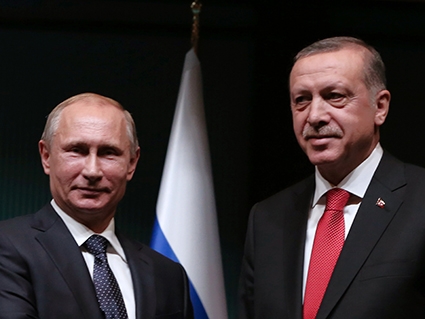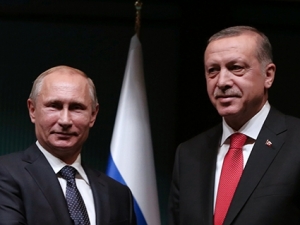The Anti-Turkish Coalition, Members: 1.5
OPED
After cancelling the visa-free travel and lifting the trade embargo, the Kremlin began forming an anti-Turkish coalition. For now the coalition is represented only by Russia, however, soon this solidity will be brought to an end and Sokhumi will also be found standing beside Moscow. On January 11th, the de facto government of occupied Abkhazia issued a decree, according to which any kind of trade, economic or financial relations with Turkey is now banned. The ban is officially to begin from January 20th, however, Russia’s navy took care of this in advance, in November 2015 to be precise, and blocked Abkhazia’s waters following the Turkish take down of a Russian bomber.
The accession of Abkhazia to the Turkish embargo was also decided at the end of last year, when President Putin’s assistant Vladimer Surkov went there to remind local officials of the “alliance and strategic partnership agreement” signed with the Kremlin, especially the part of the agreement in which it discusses the coordinated foreign policy. Moscow has long been frustrated to observe the Turkish-Abkhazian relations. In fact, these relations, which are getting deeper and deeper, should be worrying Tbilisi too, however, in this case, Georgian diplomacy chooses to be pragmatic, since Ankara does not recognize Abkhazian independence and because the activity of the Abkhazian diaspora in Turkey should not become a reason to devaluate relations with such a big trading and transport partner.
They think completely differently in Moscow, as the North-Caucasus problem is still unresolved; the “Cherkezian Bomb” is ticking and for sure they are unhappy with the introduction of Turkish “soft power” along the Black Sea coast and later its gradual strengthening by trading, informational, cultural or other means. Therefore, Surkov decided to take advantage of the open confrontation that arose between Russia and Turkey and to ask Sokhumi to prove its loyalty with this excuse. And not only to prove, but to take specific and quite painful steps too. “We cannot allow Turkish construction companies to be financed with Russian money,” Surkov told the de facto government of occupied Abkhazia.
Abkhazia’s budget is 13.5 million Rubles – approximately USD 182 million. 90 percent of this sum comes directly from the Kremlin, therefore the Kremlin’s demand is understandable. The foreign-trading turnover is USD 200 million. According to Russian and Abkhazian sources, approximately 10 percent of occupied Abkhazia’s export goes to Turkey, mainly coal, scrap metal and fish, while mostly construction material, fuel, food and textiles are imported from Turkey. Forcing Abkhazians into this embargo will cost Moscow 8 billion Rubles, that is about USD 110 million. Exactly this amount has already been ear-marked by Russia to be sent to the occupied territory in 2016.
Expert Gia Khukhashvili thinks that, in future, Russia will increase its influence in the region and bring the influence of other States to the minimum: “Abkhazia’s unofficial contacts with Turkey took place outside Georgia’s will. Limitation of these does not change anything for us. I rule out that Abkhazian’s will risk forming economic relations through Georgia, as the occupying regime is fully controlling the administrative border. It is not a secret to anyone that a quantity of Abkhazian nuts was re-exported to Turkey through Georgia. Maybe Russia will turn a blind eye on this, but for sure Turkish goods won’t be brought into Abkhazia via Georgia,” the expert said.
The Russian – Turkish controversy is gradually relocating to the Georgian territory. No need to be a big analyst to realize that taking full control over Georgian territory is increasingly becoming the ultimate goal for Russia. By doing so, it will resolve many strategic problems, will improve its own positions in the Black Sea and will strengthen its military bases in Armenia as well as partly simplifying its aerial relations with Syria.
Zaza Jgarkava












